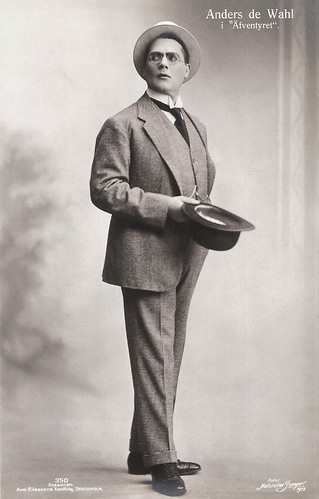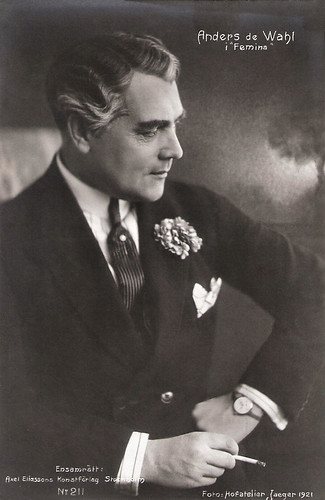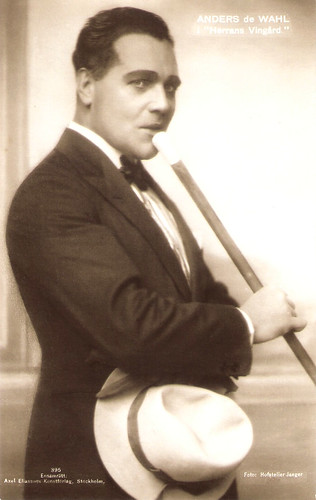Swedish actor Anders de Wahl (1869-1956) appeared in about seven films between 1920 and 1946. On stage, he was a prolific and popular performer, mainly at Vasateatern, the Swedish Theatre and Dramaten - the Royal Dramatic Theatre in Stockholm.

Swedish postcard by Axel Eliassons Konstförlag, Stockholm, no. 350. Photo: Hofatelier Jaeger, 1915. Publicity still for the play Afventyret by Valentin Le Barroyer, performed at the Dramaten theatre in Stockholm in 1915, under direction of Karl Hedberg.

Swedish postcard by Nordisk Konst, Stockholm, no. 1097/2. Anders de Wahl and Karin Molander in Erotikon (Mauritz Stiller, 1920).
Anders de Wahl was born as Andreas de Wahl in 1869 in Stockholm, Sweden. He was the son of the music director Oscar de Wahl and the actress and operetta singer Anna de Wahl, born Lundström.
After employment at Wicanders cork factory offices, De Wahl was a student at Dramaten (the Royal Dramatic Theatre) from 1889 till 1891. There he debuted in 1890 as Nils in Mäster Olof (Master Olof) by August Strindberg.
From 1891 till 1892 he played for August Lindberg's theatre group and from 1892 till 1907 at the Albert Ranft Theatre Company. De Wahl wrote the play Too early, in which he played the role of Ville in 1892 which became one of his early successes.
From 1907 till 1919 he worked at Dramaten . In 1920-1922 he worked at the Svenska Teatern (Swedish Theatre) and again at Dramaten, from 1922 till 1951.
He often worked with the directors Olaf Molander and Alf Sjöberg. He also directed some plays himself. De Wahl also played in Copenhagen, Oslo and Helsinki, and conducted his own tours in Sweden. He also toured in the United States as a reader.
Martin Banham mentions in The Cambridge Guide to Theatre that De Wahl was popular until the late 1920s, when the more natural style of Lars Hanson replaced his romantic, exuberant style. De Wahl excelled as personality actor, often performing troubled souls as August Strindberg’s Erik XIV (1899) and his King Magnus (1901). Though he opposed modernism in theatre, he did perform in plays by Luigi Pirandello such as Six Characters in Search of an Author (1925), Henry IV (1926) and The Pleasure of Honesty (1930) and made the author thus popular in Sweden.
In 1930, he had an enormous success with the title role in Hjalmar Bergman's comedy Markurells from Wadköbing (1930). For posterity, Anders de Wahl will be inextricably linked with this role, in Sweden.

Swedish postcard by Nordisk Konst, Stockholm, no. 1097/3. Anders de Wahl and Karin Molander in Erotikon (Mauritz Stiller, 1920).

Swedish postcard by Axel Eliassons Konstförlag, Stockholm, no. 193. Photo: Skandia Film. Anders de Wahl in Kvarnen/The Windmill (John W. Brunius, 1921). The film was shot at the Skandia studio at Lidingö, with exteriors were shot at Sjöbo and Skåne by Hugo Edlund. The basis for the film was the novel Møllen (The Mill, 1896) by Karl Gjellerup. During filming in Sjöbo a real old mill burned down right in face of the camera. The Swedish Film Institute's film archive holds a restored print of the film.
In the cinema Anders de Wahl became known when he starred in the silent, subversive tragi-comedy Erotikon (Mauritz Stiller, 1920). He played the entomology professor Leo Charpentier who is obsessed with the sexual life of bugs. In the meanwhile his easy-going wife (Tora Teje) is courted by two suitors. The film was based on a play by Hungarian writer Ferenc Herczeg and scripted by future film director Gustav Molander, Stiller and Arthur Nordén. Erotikon became a commercial success and was sold to 45 markets abroad.
In his second film Kvarnen/The Mill (John W. Brunius, 1921), De Wahl played a very different character as a miller who is lured and blinded by a seductive ‘tattare’ woman working at his farm.
De Wahl also appeared in the silent films Kalle Utter (Karin Swanström, 1925) and Flygande holländaren/Flying Dutchman (Karin Swanström, 1925), with German actor Werner Fuetterer.
His popularity diminished after the 1920s. After the introduction of the sound film, he played the lead in Vad veta väl männen/What do the men know? (Edvin Adolphson, 1933). It was the Swedish version of the German film Was wissen den Männer? (Gerhard Lamprecht, 1933).
Five years later De Wahl appeared in Med folket för fosterlandet (Sigurd Wallén, 1938) in which he was himself as the New Year's Reader of Lord Alfred Tennyson's poem New Year's Clock. De Wahl was famous in Sweden for calling in the New Year ("Ring klocka, ring..."/Ring Out, Wild Bells...) at Skansen in Stockholm for sixty years (1895-1955).
The grand old actor played his last stage role under the direction of Ingmar Bergman in Björn Erik Höijer's Light in the Shack.
Anders de Wahl died in Stockholm in 1956. He was 87. De Wahl was unmarried and is buried at Adolf Fredriks Cemetery in Stockholm.

Swedish postcard by Axel Eliassons Konstförlag, Stockholm, no. 211. Photo: Hofatelier Jaeger, 1921. Publicity still for the play Femina.

Swedish postcard by Axel Eliassons Konstförlag, Stockholm, no. 395. Photo: Hofatelier Jaeger. Publicity still for the play Herrans Vingard.
Sources: Martin Banham (Cambridge Guide to Theatre), Find A Grave, Wikipedia (Swedish, German and English) and IMDb.

Swedish postcard by Axel Eliassons Konstförlag, Stockholm, no. 350. Photo: Hofatelier Jaeger, 1915. Publicity still for the play Afventyret by Valentin Le Barroyer, performed at the Dramaten theatre in Stockholm in 1915, under direction of Karl Hedberg.

Swedish postcard by Nordisk Konst, Stockholm, no. 1097/2. Anders de Wahl and Karin Molander in Erotikon (Mauritz Stiller, 1920).
Dramaten
Anders de Wahl was born as Andreas de Wahl in 1869 in Stockholm, Sweden. He was the son of the music director Oscar de Wahl and the actress and operetta singer Anna de Wahl, born Lundström.
After employment at Wicanders cork factory offices, De Wahl was a student at Dramaten (the Royal Dramatic Theatre) from 1889 till 1891. There he debuted in 1890 as Nils in Mäster Olof (Master Olof) by August Strindberg.
From 1891 till 1892 he played for August Lindberg's theatre group and from 1892 till 1907 at the Albert Ranft Theatre Company. De Wahl wrote the play Too early, in which he played the role of Ville in 1892 which became one of his early successes.
From 1907 till 1919 he worked at Dramaten . In 1920-1922 he worked at the Svenska Teatern (Swedish Theatre) and again at Dramaten, from 1922 till 1951.
He often worked with the directors Olaf Molander and Alf Sjöberg. He also directed some plays himself. De Wahl also played in Copenhagen, Oslo and Helsinki, and conducted his own tours in Sweden. He also toured in the United States as a reader.
Martin Banham mentions in The Cambridge Guide to Theatre that De Wahl was popular until the late 1920s, when the more natural style of Lars Hanson replaced his romantic, exuberant style. De Wahl excelled as personality actor, often performing troubled souls as August Strindberg’s Erik XIV (1899) and his King Magnus (1901). Though he opposed modernism in theatre, he did perform in plays by Luigi Pirandello such as Six Characters in Search of an Author (1925), Henry IV (1926) and The Pleasure of Honesty (1930) and made the author thus popular in Sweden.
In 1930, he had an enormous success with the title role in Hjalmar Bergman's comedy Markurells from Wadköbing (1930). For posterity, Anders de Wahl will be inextricably linked with this role, in Sweden.

Swedish postcard by Nordisk Konst, Stockholm, no. 1097/3. Anders de Wahl and Karin Molander in Erotikon (Mauritz Stiller, 1920).

Swedish postcard by Axel Eliassons Konstförlag, Stockholm, no. 193. Photo: Skandia Film. Anders de Wahl in Kvarnen/The Windmill (John W. Brunius, 1921). The film was shot at the Skandia studio at Lidingö, with exteriors were shot at Sjöbo and Skåne by Hugo Edlund. The basis for the film was the novel Møllen (The Mill, 1896) by Karl Gjellerup. During filming in Sjöbo a real old mill burned down right in face of the camera. The Swedish Film Institute's film archive holds a restored print of the film.
Erotikon
In the cinema Anders de Wahl became known when he starred in the silent, subversive tragi-comedy Erotikon (Mauritz Stiller, 1920). He played the entomology professor Leo Charpentier who is obsessed with the sexual life of bugs. In the meanwhile his easy-going wife (Tora Teje) is courted by two suitors. The film was based on a play by Hungarian writer Ferenc Herczeg and scripted by future film director Gustav Molander, Stiller and Arthur Nordén. Erotikon became a commercial success and was sold to 45 markets abroad.
In his second film Kvarnen/The Mill (John W. Brunius, 1921), De Wahl played a very different character as a miller who is lured and blinded by a seductive ‘tattare’ woman working at his farm.
De Wahl also appeared in the silent films Kalle Utter (Karin Swanström, 1925) and Flygande holländaren/Flying Dutchman (Karin Swanström, 1925), with German actor Werner Fuetterer.
His popularity diminished after the 1920s. After the introduction of the sound film, he played the lead in Vad veta väl männen/What do the men know? (Edvin Adolphson, 1933). It was the Swedish version of the German film Was wissen den Männer? (Gerhard Lamprecht, 1933).
Five years later De Wahl appeared in Med folket för fosterlandet (Sigurd Wallén, 1938) in which he was himself as the New Year's Reader of Lord Alfred Tennyson's poem New Year's Clock. De Wahl was famous in Sweden for calling in the New Year ("Ring klocka, ring..."/Ring Out, Wild Bells...) at Skansen in Stockholm for sixty years (1895-1955).
The grand old actor played his last stage role under the direction of Ingmar Bergman in Björn Erik Höijer's Light in the Shack.
Anders de Wahl died in Stockholm in 1956. He was 87. De Wahl was unmarried and is buried at Adolf Fredriks Cemetery in Stockholm.

Swedish postcard by Axel Eliassons Konstförlag, Stockholm, no. 211. Photo: Hofatelier Jaeger, 1921. Publicity still for the play Femina.

Swedish postcard by Axel Eliassons Konstförlag, Stockholm, no. 395. Photo: Hofatelier Jaeger. Publicity still for the play Herrans Vingard.
Sources: Martin Banham (Cambridge Guide to Theatre), Find A Grave, Wikipedia (Swedish, German and English) and IMDb.
No comments:
Post a Comment